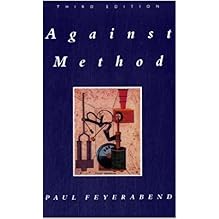 Against Method
Against Method Against Method
Against MethodAgainst Method by PaulFeyerabend (Verso Books, 1975; ISBN 0860916464 )

Review ripped from amazon.com:
Lessons in scientific anarchism
Philosophy of science can be fun at times. This book proves it. Feyerabend wanted to shock the scientific community when he wrote it, and was very good at it.
What are the main theses of the book? First, "the" scientific method does not exist. Scientists have to invent new methodologies on their way to discovery. Second, sometimes progress requires theories that contradict facts as scientists perceive them. Third, sometimes it requires irrational arguments in order to get your point across in science. Fourth, science does not deserve a special status in a social debate.
To many scientists, these ideas would sound provocative even expressed in the politest of manners. But that was not Feyerabend's style. On the contrary, Feyerabend overdid many of his statements ("The only principle that does not inhibit progress is: anything goes"), and he made rude remarks. Some of his statements are not very well supported by arguments. That, of course, is hardly surprising for someone who defends some irrationality in science. But it will not convince a hard-boiled rationalist. Also, Feyerabend's exaggerations made it easier for his critics to criticize him.
And still, Feyerabend knew what he was talking about. Scientists are indeed sloppier and more irrational than they pretend to be. GalileoGalilei's statement that the earth rotates around its axis did contradict the "fact" that nobody ever noticed any influence of this rotation. And it was not science that first pointed out the dangers of environmental pollution.
Conclusion: Against Method is a classic, and it deserves it. It's a very interesting book for those who know how to read it.
-- Alex De Visscher
What I enjoy most about the book is the author's refreshingly honest and direct treatment of the subject matter. Unlike many, quite contemptible, people who've bought into some kind of Rationalist or PoMo worldview, PaulFeyerabend is comfortable making judgements against his opponents and their worldviews.
He doesn't believe that facts are culture-neutral (objective) and he doesn't believe that culture is value-neutral (subjective). On the contrary, facts are cultural and culture has values so if some fact embraces tyranny then it is morally reprehensible as a consequence.
Put a different way, PaulFeyerabend believes that value judgements are an integral part of the world and that decontaminating knowledge from values only serves to impoverish it and to distort reality. -- RK
Perhaps the "scientific method" depends on random mutations just as much natural selection.
Perhaps, but beware of equating variation in method with a lack of rigour. Science is characterized by rigour, regardless of method, even in fields that rely heavily on speculation in the absence of overwhelming evidence, such as archaeology or certain branches of physics.
We can agree that rigor is required to evaluate and refine ideas, but the raw ideas and discoveries may be helped by a bit of chaos.
 EditText of this page
(last edited April 9, 2009)
or FindPage with title or text search
EditText of this page
(last edited April 9, 2009)
or FindPage with title or text search